An In-Depth Review of Prominent Leadership Theories and Concepts
VerifiedAdded on 2023/02/06
|5
|1056
|51
Essay
AI Summary
This essay provides an overview of major leadership theories, including Great Man, Trait, Contingency, Situational, Behavioral, Participative, Management (Transactional), and Relationship (Transformational) theories. It explains the core tenets of each theory, highlighting their strengths and weaknesses. The essay emphasizes how leadership can be approached in different ways, from focusing on situational aspects to emphasizing personality traits. It concludes that leadership is a multi-faceted subject determined by various factors, and that some individuals become great leaders due to a combination of inherent qualities and learned behaviors.
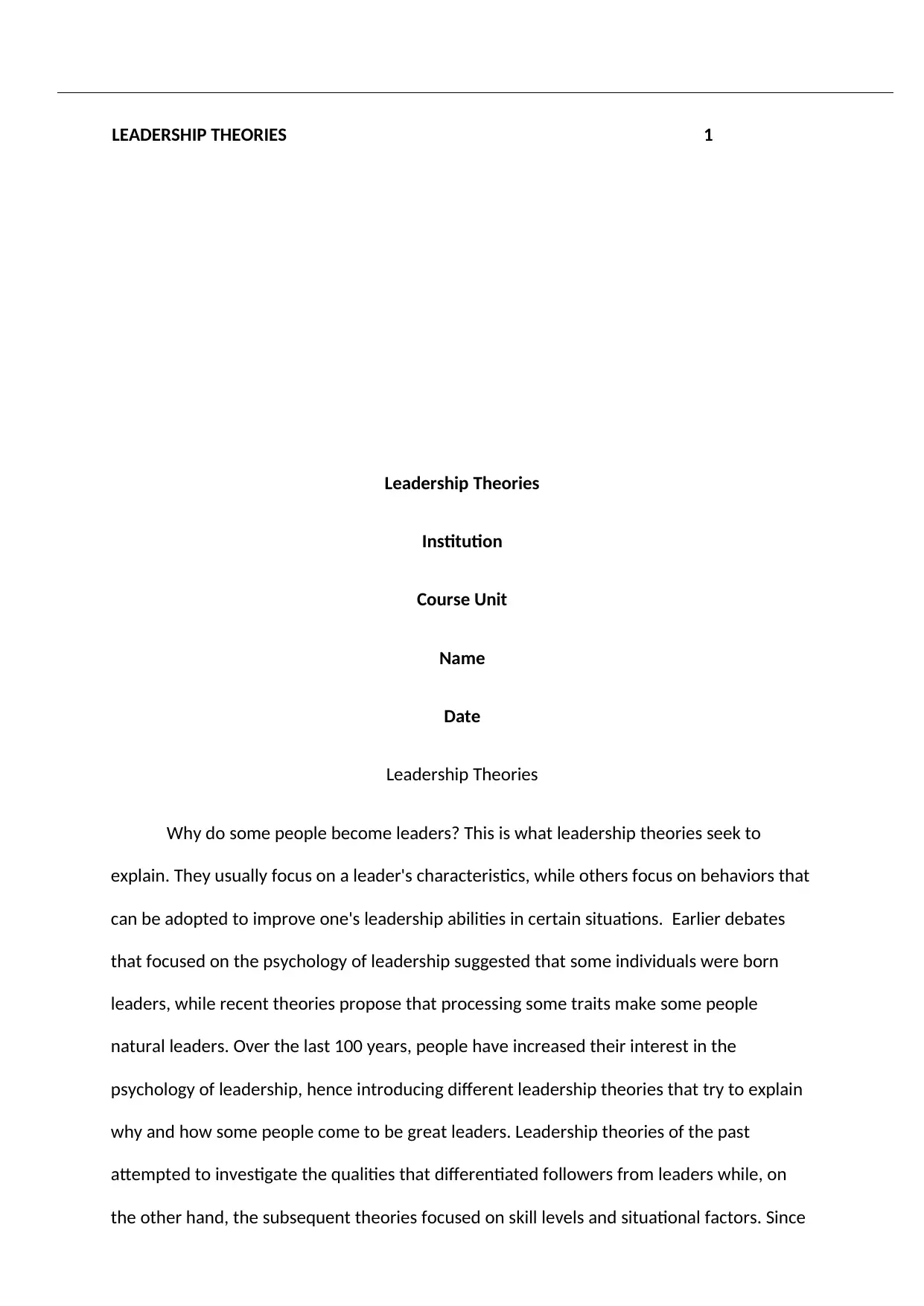
LEADERSHIP THEORIES 1
Leadership Theories
Institution
Course Unit
Name
Date
Leadership Theories
Why do some people become leaders? This is what leadership theories seek to
explain. They usually focus on a leader's characteristics, while others focus on behaviors that
can be adopted to improve one's leadership abilities in certain situations. Earlier debates
that focused on the psychology of leadership suggested that some individuals were born
leaders, while recent theories propose that processing some traits make some people
natural leaders. Over the last 100 years, people have increased their interest in the
psychology of leadership, hence introducing different leadership theories that try to explain
why and how some people come to be great leaders. Leadership theories of the past
attempted to investigate the qualities that differentiated followers from leaders while, on
the other hand, the subsequent theories focused on skill levels and situational factors. Since
Leadership Theories
Institution
Course Unit
Name
Date
Leadership Theories
Why do some people become leaders? This is what leadership theories seek to
explain. They usually focus on a leader's characteristics, while others focus on behaviors that
can be adopted to improve one's leadership abilities in certain situations. Earlier debates
that focused on the psychology of leadership suggested that some individuals were born
leaders, while recent theories propose that processing some traits make some people
natural leaders. Over the last 100 years, people have increased their interest in the
psychology of leadership, hence introducing different leadership theories that try to explain
why and how some people come to be great leaders. Leadership theories of the past
attempted to investigate the qualities that differentiated followers from leaders while, on
the other hand, the subsequent theories focused on skill levels and situational factors. Since
Paraphrase This Document
Need a fresh take? Get an instant paraphrase of this document with our AI Paraphraser
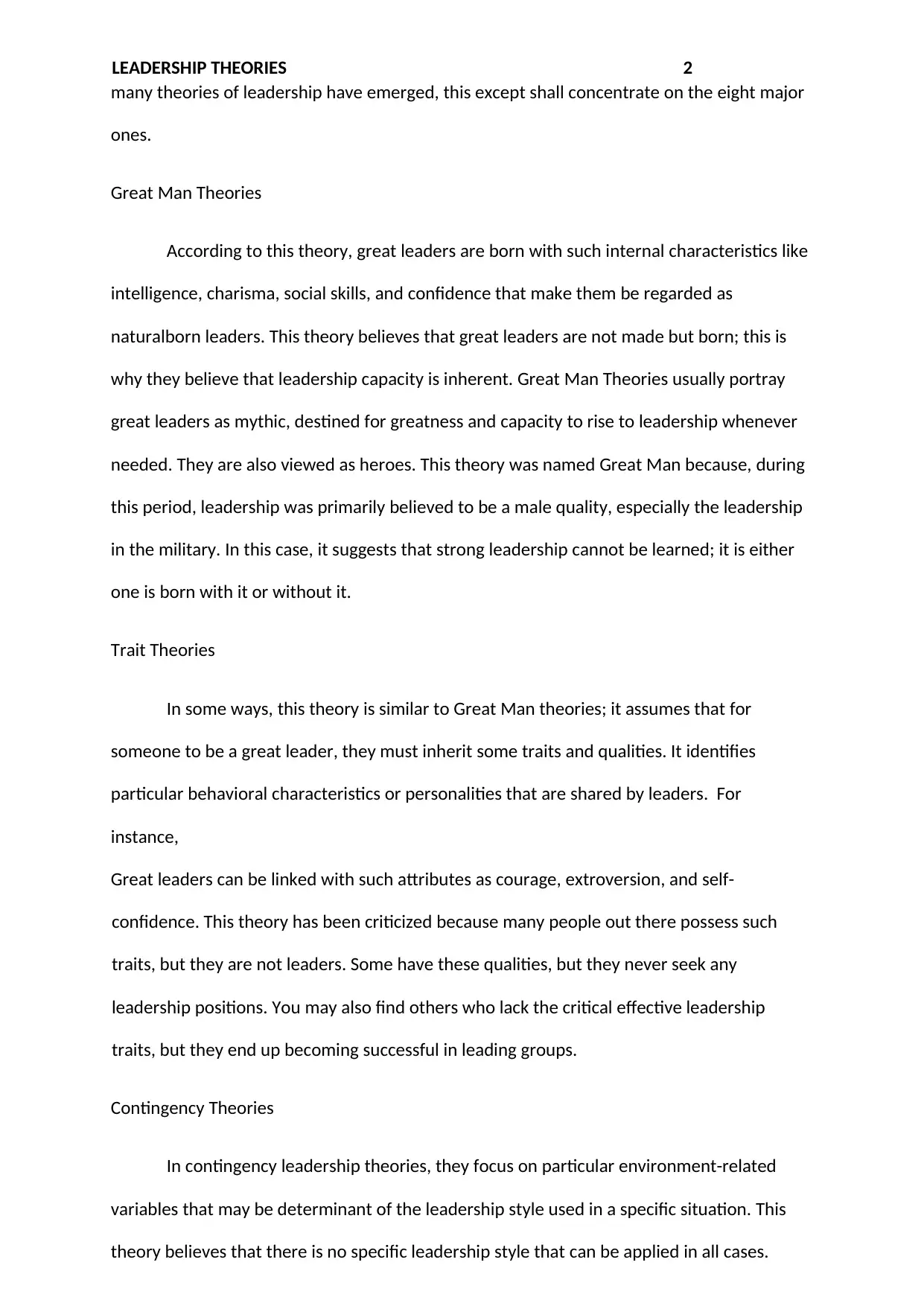
LEADERSHIP THEORIES 2
many theories of leadership have emerged, this except shall concentrate on the eight major
ones.
Great Man Theories
According to this theory, great leaders are born with such internal characteristics like
intelligence, charisma, social skills, and confidence that make them be regarded as
naturalborn leaders. This theory believes that great leaders are not made but born; this is
why they believe that leadership capacity is inherent. Great Man Theories usually portray
great leaders as mythic, destined for greatness and capacity to rise to leadership whenever
needed. They are also viewed as heroes. This theory was named Great Man because, during
this period, leadership was primarily believed to be a male quality, especially the leadership
in the military. In this case, it suggests that strong leadership cannot be learned; it is either
one is born with it or without it.
Trait Theories
In some ways, this theory is similar to Great Man theories; it assumes that for
someone to be a great leader, they must inherit some traits and qualities. It identifies
particular behavioral characteristics or personalities that are shared by leaders. For
instance,
Great leaders can be linked with such attributes as courage, extroversion, and self-
confidence. This theory has been criticized because many people out there possess such
traits, but they are not leaders. Some have these qualities, but they never seek any
leadership positions. You may also find others who lack the critical effective leadership
traits, but they end up becoming successful in leading groups.
Contingency Theories
In contingency leadership theories, they focus on particular environment-related
variables that may be determinant of the leadership style used in a specific situation. This
theory believes that there is no specific leadership style that can be applied in all cases.
many theories of leadership have emerged, this except shall concentrate on the eight major
ones.
Great Man Theories
According to this theory, great leaders are born with such internal characteristics like
intelligence, charisma, social skills, and confidence that make them be regarded as
naturalborn leaders. This theory believes that great leaders are not made but born; this is
why they believe that leadership capacity is inherent. Great Man Theories usually portray
great leaders as mythic, destined for greatness and capacity to rise to leadership whenever
needed. They are also viewed as heroes. This theory was named Great Man because, during
this period, leadership was primarily believed to be a male quality, especially the leadership
in the military. In this case, it suggests that strong leadership cannot be learned; it is either
one is born with it or without it.
Trait Theories
In some ways, this theory is similar to Great Man theories; it assumes that for
someone to be a great leader, they must inherit some traits and qualities. It identifies
particular behavioral characteristics or personalities that are shared by leaders. For
instance,
Great leaders can be linked with such attributes as courage, extroversion, and self-
confidence. This theory has been criticized because many people out there possess such
traits, but they are not leaders. Some have these qualities, but they never seek any
leadership positions. You may also find others who lack the critical effective leadership
traits, but they end up becoming successful in leading groups.
Contingency Theories
In contingency leadership theories, they focus on particular environment-related
variables that may be determinant of the leadership style used in a specific situation. This
theory believes that there is no specific leadership style that can be applied in all cases.
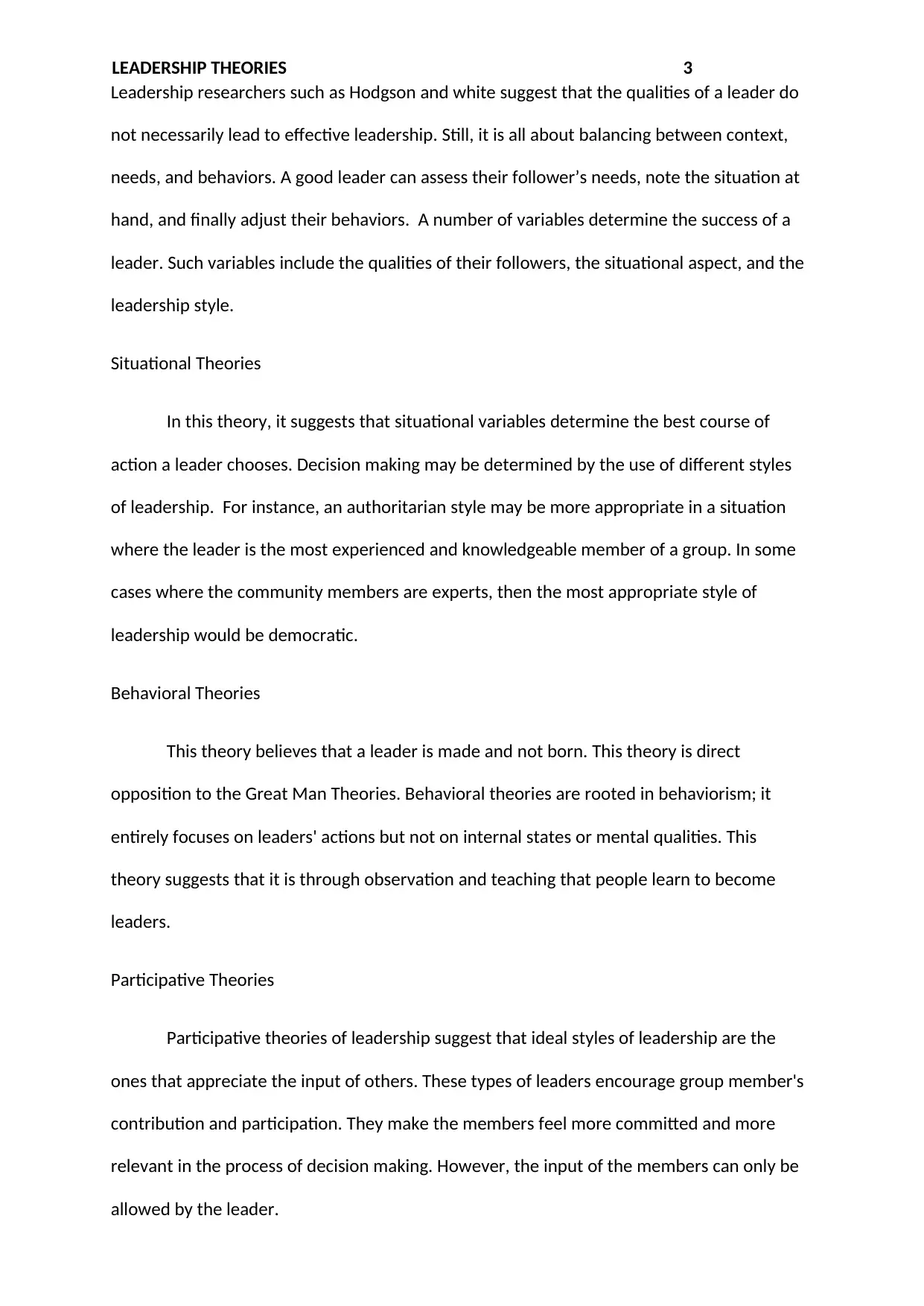
LEADERSHIP THEORIES 3
Leadership researchers such as Hodgson and white suggest that the qualities of a leader do
not necessarily lead to effective leadership. Still, it is all about balancing between context,
needs, and behaviors. A good leader can assess their follower’s needs, note the situation at
hand, and finally adjust their behaviors. A number of variables determine the success of a
leader. Such variables include the qualities of their followers, the situational aspect, and the
leadership style.
Situational Theories
In this theory, it suggests that situational variables determine the best course of
action a leader chooses. Decision making may be determined by the use of different styles
of leadership. For instance, an authoritarian style may be more appropriate in a situation
where the leader is the most experienced and knowledgeable member of a group. In some
cases where the community members are experts, then the most appropriate style of
leadership would be democratic.
Behavioral Theories
This theory believes that a leader is made and not born. This theory is direct
opposition to the Great Man Theories. Behavioral theories are rooted in behaviorism; it
entirely focuses on leaders' actions but not on internal states or mental qualities. This
theory suggests that it is through observation and teaching that people learn to become
leaders.
Participative Theories
Participative theories of leadership suggest that ideal styles of leadership are the
ones that appreciate the input of others. These types of leaders encourage group member's
contribution and participation. They make the members feel more committed and more
relevant in the process of decision making. However, the input of the members can only be
allowed by the leader.
Leadership researchers such as Hodgson and white suggest that the qualities of a leader do
not necessarily lead to effective leadership. Still, it is all about balancing between context,
needs, and behaviors. A good leader can assess their follower’s needs, note the situation at
hand, and finally adjust their behaviors. A number of variables determine the success of a
leader. Such variables include the qualities of their followers, the situational aspect, and the
leadership style.
Situational Theories
In this theory, it suggests that situational variables determine the best course of
action a leader chooses. Decision making may be determined by the use of different styles
of leadership. For instance, an authoritarian style may be more appropriate in a situation
where the leader is the most experienced and knowledgeable member of a group. In some
cases where the community members are experts, then the most appropriate style of
leadership would be democratic.
Behavioral Theories
This theory believes that a leader is made and not born. This theory is direct
opposition to the Great Man Theories. Behavioral theories are rooted in behaviorism; it
entirely focuses on leaders' actions but not on internal states or mental qualities. This
theory suggests that it is through observation and teaching that people learn to become
leaders.
Participative Theories
Participative theories of leadership suggest that ideal styles of leadership are the
ones that appreciate the input of others. These types of leaders encourage group member's
contribution and participation. They make the members feel more committed and more
relevant in the process of decision making. However, the input of the members can only be
allowed by the leader.
⊘ This is a preview!⊘
Do you want full access?
Subscribe today to unlock all pages.

Trusted by 1+ million students worldwide
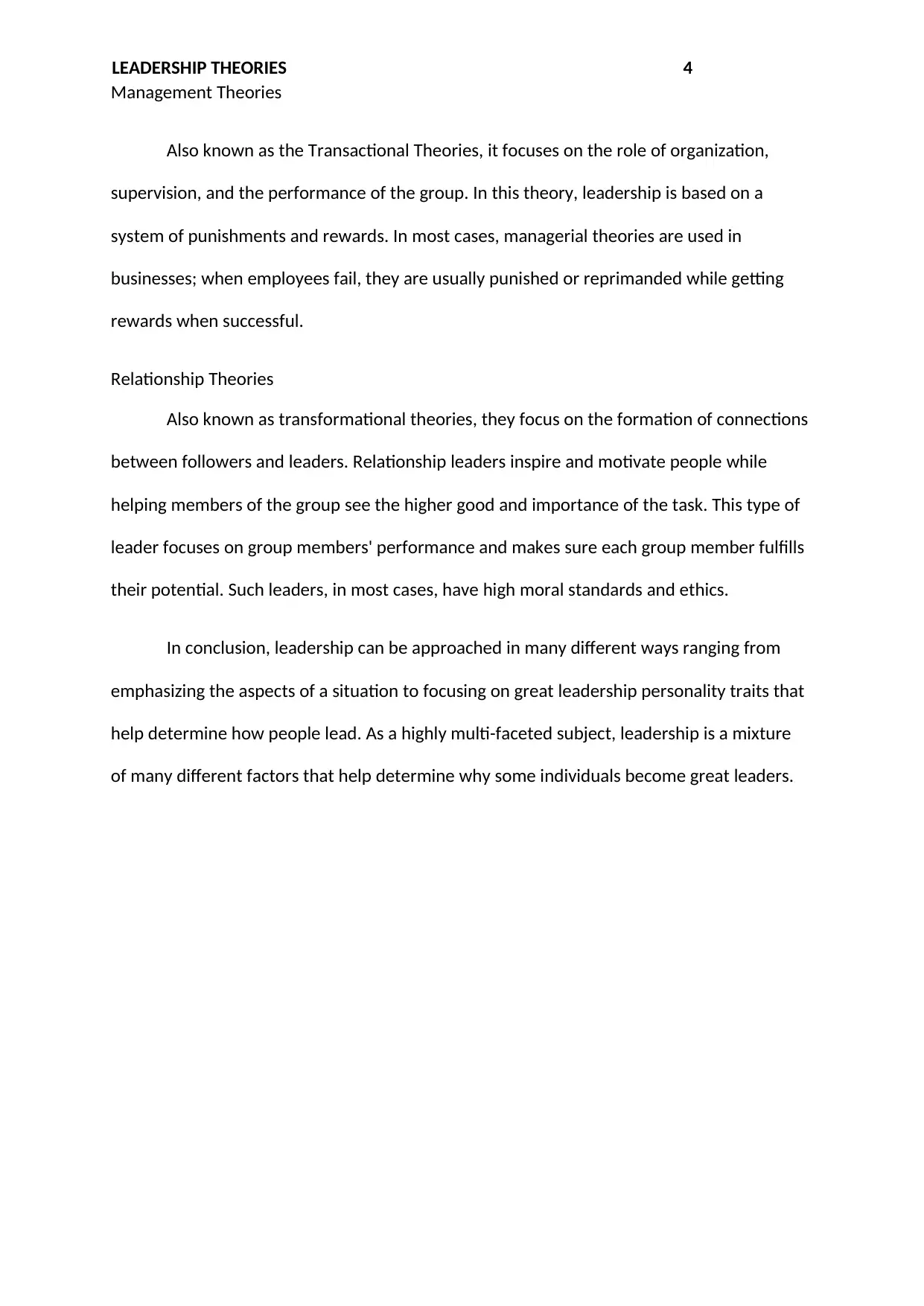
LEADERSHIP THEORIES 4
Management Theories
Also known as the Transactional Theories, it focuses on the role of organization,
supervision, and the performance of the group. In this theory, leadership is based on a
system of punishments and rewards. In most cases, managerial theories are used in
businesses; when employees fail, they are usually punished or reprimanded while getting
rewards when successful.
Relationship Theories
Also known as transformational theories, they focus on the formation of connections
between followers and leaders. Relationship leaders inspire and motivate people while
helping members of the group see the higher good and importance of the task. This type of
leader focuses on group members' performance and makes sure each group member fulfills
their potential. Such leaders, in most cases, have high moral standards and ethics.
In conclusion, leadership can be approached in many different ways ranging from
emphasizing the aspects of a situation to focusing on great leadership personality traits that
help determine how people lead. As a highly multi-faceted subject, leadership is a mixture
of many different factors that help determine why some individuals become great leaders.
Management Theories
Also known as the Transactional Theories, it focuses on the role of organization,
supervision, and the performance of the group. In this theory, leadership is based on a
system of punishments and rewards. In most cases, managerial theories are used in
businesses; when employees fail, they are usually punished or reprimanded while getting
rewards when successful.
Relationship Theories
Also known as transformational theories, they focus on the formation of connections
between followers and leaders. Relationship leaders inspire and motivate people while
helping members of the group see the higher good and importance of the task. This type of
leader focuses on group members' performance and makes sure each group member fulfills
their potential. Such leaders, in most cases, have high moral standards and ethics.
In conclusion, leadership can be approached in many different ways ranging from
emphasizing the aspects of a situation to focusing on great leadership personality traits that
help determine how people lead. As a highly multi-faceted subject, leadership is a mixture
of many different factors that help determine why some individuals become great leaders.
Paraphrase This Document
Need a fresh take? Get an instant paraphrase of this document with our AI Paraphraser
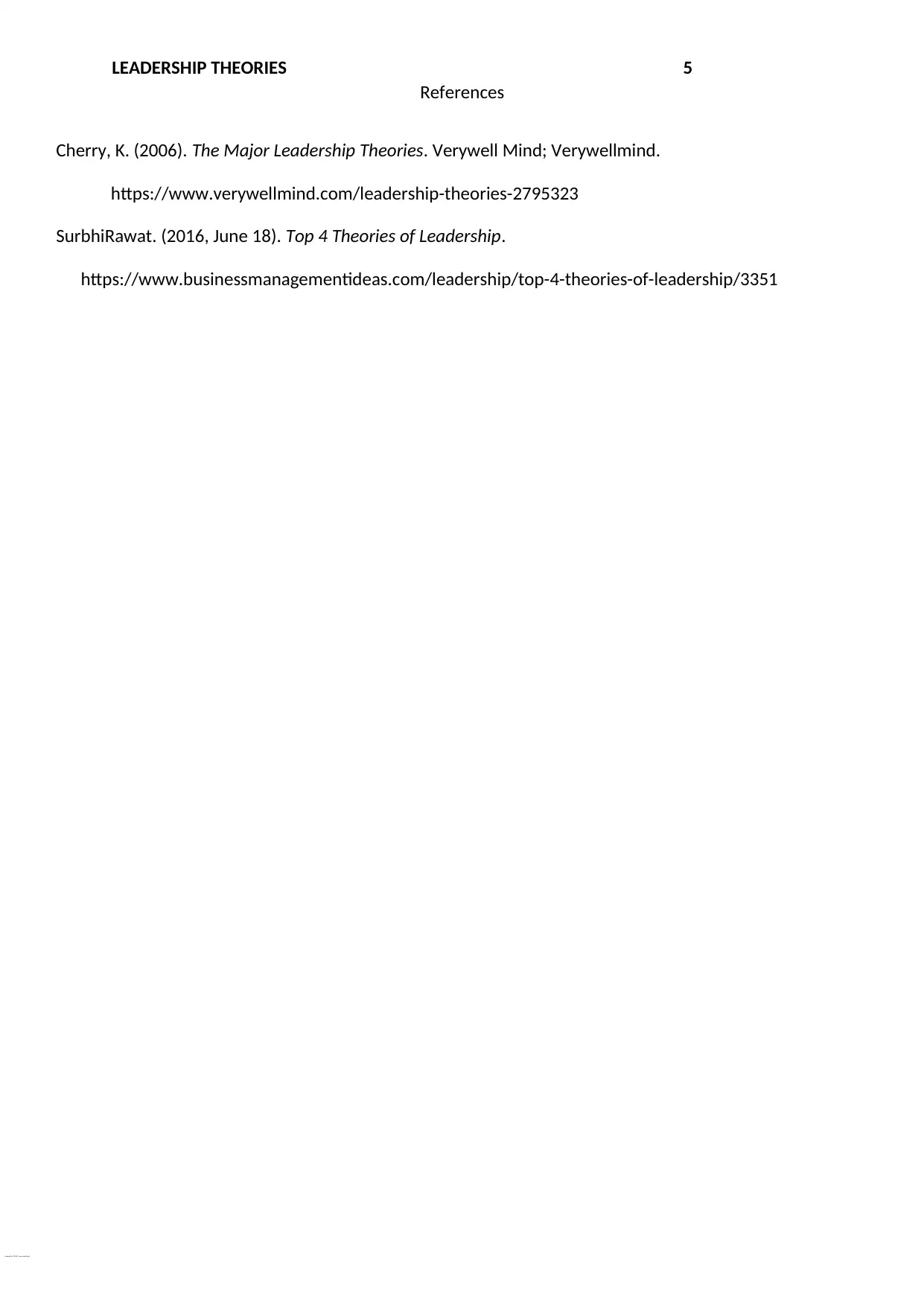
LEADERSHIP THEORIES 5
References
Cherry, K. (2006). The Major Leadership Theories. Verywell Mind; Verywellmind.
https://www.verywellmind.com/leadership-theories-2795323
SurbhiRawat. (2016, June 18). Top 4 Theories of Leadership.
https://www.businessmanagementideas.com/leadership/top-4-theories-of-leadership/3351
Powered by TCPDF (www.tcpdf.org)
References
Cherry, K. (2006). The Major Leadership Theories. Verywell Mind; Verywellmind.
https://www.verywellmind.com/leadership-theories-2795323
SurbhiRawat. (2016, June 18). Top 4 Theories of Leadership.
https://www.businessmanagementideas.com/leadership/top-4-theories-of-leadership/3351
Powered by TCPDF (www.tcpdf.org)
1 out of 5
Related Documents
Your All-in-One AI-Powered Toolkit for Academic Success.
+13062052269
info@desklib.com
Available 24*7 on WhatsApp / Email
![[object Object]](/_next/static/media/star-bottom.7253800d.svg)
Unlock your academic potential
Copyright © 2020–2026 A2Z Services. All Rights Reserved. Developed and managed by ZUCOL.





